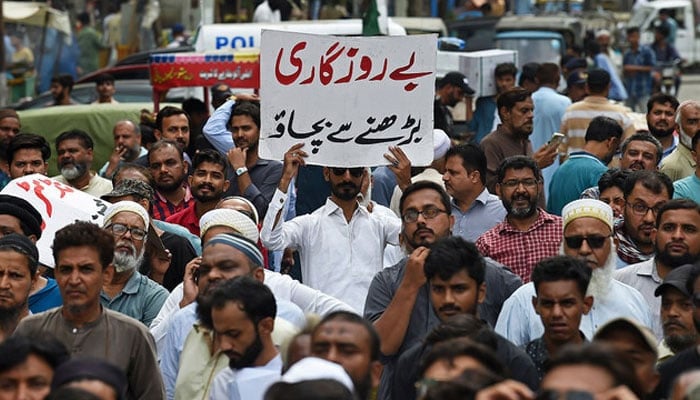Unemployment crisis
Issues such as climate change, gender parity, unemployment, and poverty, are on back burner
LAHORE: Some crucial issues, such as climate change, gender parity, unemployment, and poverty, are on the back burner because the current regime’s priority is to enter a medium-term arrangement with the IMF and combat the increasing wave of terrorism.
Regarding climate change, we lack both the necessary resources and the government’s will to take resource-independent steps. The pollution of clean water channels could be halted immediately through strict administrative action. Smoke-emitting industries should be shut down at once. This may upset the influential polluters. Does the government have the strength to confront influential segments of society?
None of our governments have truly been serious about the emancipation of women. There are women’s ministries in federal and provincial governments that act against discrimination towards educated women in cities, but the main victims of exploitation are those living in rural communities and the poor maids serving affluent localities in cities. The plight of these maids has never been taken seriously, despite numerous political statements. Those who issue statements often hire maids and exploit them like all others. Some women-related issues require better administration rather than finances.
The unemployment rate in Pakistan has exceeded 10.2 percent, up from the usual 5-6 percent. There is no short-term job creation prospect. Government policies are such that they suppress growth, and jobs are a result of growth. In fact, there is a chance that unemployment levels might rise further. We are not discussing quality employment but employment where an individual earns far less than their genuine needs. These employees are daily wagers (who fail to find work 3 days a week), factory workers, or shop attendants paid well below the daily wage. It is unfortunate that even these low-level jobs are scarce.
Poverty is the outcome of high inflation, rupee depreciation and high unemployment. The present regime seems helpless in addressing these issues. For the last six years we have been ignoring the actual issue of poverty and have resorted to providing subsidized food, free food or nominal cash to millions of poor.
This is not a solution and we lack resources to cover all the poor as poverty currently afflicts over 40 percent of the country's population. Poverty in other countries has reduced when instead of unconditional subsidies, conditional transfers were made and poor were asked to do communal service or enroll their children, particularly girls in schools.
While the government seems helpless in addressing the above issue because of resource constraints and weak governance, it has to arrange resources by any means to tackle the new wave of terrorism in the country. In the meantime the IMF conditions are very tough. The need to increase power and gas rates since the last three years is because we did not reform our gas and power sectors. It seems corruption, mismanagement and incompetence in these sectors has increased in line with the increase in tariff. The IMF is interested in the balancing of finances in each sector. It is for the government of Pakistan to bring transparency in sectors that are bleeding our resources and threatening our existence.
-
 Bad Bunny Headlines Super Bowl With Hits, Dancers And Celebrity Guests
Bad Bunny Headlines Super Bowl With Hits, Dancers And Celebrity Guests -
 Insiders Weigh In On Kim Kardashian And Lewis Hamilton's Relationship
Insiders Weigh In On Kim Kardashian And Lewis Hamilton's Relationship -
 Prince William, Kate Middleton Private Time At Posh French Location Laid Bare
Prince William, Kate Middleton Private Time At Posh French Location Laid Bare -
 Stefon Diggs Family Explained: How Many Children The Patriots Star Has And With Whom
Stefon Diggs Family Explained: How Many Children The Patriots Star Has And With Whom -
 ‘Narcissist’ Andrew Still Feels ‘invincible’ After Exile
‘Narcissist’ Andrew Still Feels ‘invincible’ After Exile -
 Shamed Andrew ‘mental State’ Under Scrutiny Amid Difficult Time
Shamed Andrew ‘mental State’ Under Scrutiny Amid Difficult Time -
 Bad Bunny's Super Bowl Halftime Show: What Time Will He Perform Tonight?
Bad Bunny's Super Bowl Halftime Show: What Time Will He Perform Tonight? -
 Where Is Super Bowl 2026 Taking Place? Everything To Know About The NFL Showdown
Where Is Super Bowl 2026 Taking Place? Everything To Know About The NFL Showdown -
 Chris Pratt Explains Why He And Katherine Schwarzenegger Did Premarital Counseling
Chris Pratt Explains Why He And Katherine Schwarzenegger Did Premarital Counseling -
 Drake 'turns Down' Chance To Hit Back At Kendrick Lamar At Super Bowl
Drake 'turns Down' Chance To Hit Back At Kendrick Lamar At Super Bowl -
 Sarah Ferguson Had A ‘psychosexual Network’ With Jeffrey Epstein
Sarah Ferguson Had A ‘psychosexual Network’ With Jeffrey Epstein -
 Miranda Kerr Shares The One Wellness Practice She Does With Her Kids
Miranda Kerr Shares The One Wellness Practice She Does With Her Kids -
 Czech Republic Supports Social Media Ban For Under-15
Czech Republic Supports Social Media Ban For Under-15 -
 Khloe Kardashian Shares How She And Her Sisters Handle Money Between Themselves
Khloe Kardashian Shares How She And Her Sisters Handle Money Between Themselves -
 Prince William Ready To End 'shielding' Of ‘disgraced’ Andrew Amid Epstein Scandal
Prince William Ready To End 'shielding' Of ‘disgraced’ Andrew Amid Epstein Scandal -
 Chris Hemsworth Hailed By Halle Berry For Sweet Gesture
Chris Hemsworth Hailed By Halle Berry For Sweet Gesture




